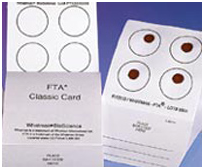Archival Notice
This is an archive page that is no longer being updated. It may contain outdated information and links may no longer function as originally intended.
Home | Glossary | Resources | Help | Contact Us | Course Map
FTA® is an acronym for fast technology for analysis of nucleic acids. It was originally developed by Burgoyne and Fowler at Flinders University in Australia in the 1980s as a means of protecting nucleic acid samples from degradation by nucleases and other processes. The concept was to apply a weak base, chelating agent, anionic surfactant or detergent, and uric acid (or a urate salt) to a cellulose based matrix (filter paper). A sample containing DNA could then be applied to the treated filter paper for preservation and long-term storage.
Whatman® licenses the FTA® technology from Flinders University. They offer a line of products using this technology, most notably filter paper cards.
Biological samples, such as blood and saliva, adhere to the paper through the mechanism of entanglement, while the mixture of chemicals lyses cells and denatures proteins. Because nucleases are inactivated, the DNA is essentially stable when the sample is properly dried and stored. Nucleic acid damage from nucleases, oxidation, ultraviolet light (UV) damage, microbes, and fungus is reduced when samples are stored on the FTA card.09,10
A marketable advantage of the FTA® technology is that samples spotted on treated cards may be stored at room temperature. The chemicals on the FTA cards enhance the preservation of the DNA and inactivate many dangerous pathogens that may be found in liquid blood samples or dried biological stains. Because the cards are small in size (approximately 3.5" x 5"), they are easily packaged, shipped, and stored for databasing.
Additional Online Courses
- What Every First Responding Officer Should Know About DNA Evidence
- Collecting DNA Evidence at Property Crime Scenes
- DNA – A Prosecutor’s Practice Notebook
- Crime Scene and DNA Basics
- Laboratory Safety Programs
- DNA Amplification
- Population Genetics and Statistics
- Non-STR DNA Markers: SNPs, Y-STRs, LCN and mtDNA
- Firearms Examiner Training
- Forensic DNA Education for Law Enforcement Decisionmakers
- What Every Investigator and Evidence Technician Should Know About DNA Evidence
- Principles of Forensic DNA for Officers of the Court
- Law 101: Legal Guide for the Forensic Expert
- Laboratory Orientation and Testing of Body Fluids and Tissues
- DNA Extraction and Quantitation
- STR Data Analysis and Interpretation
- Communication Skills, Report Writing, and Courtroom Testimony
- Español for Law Enforcement
- Amplified DNA Product Separation for Forensic Analysts



